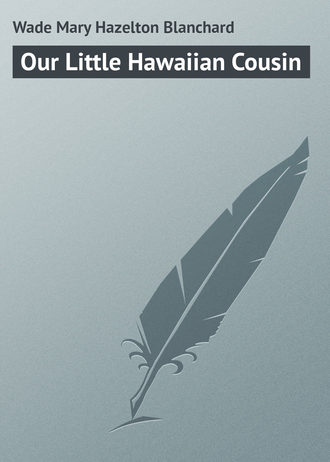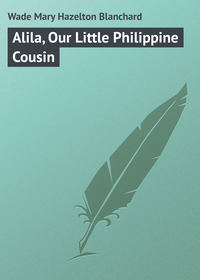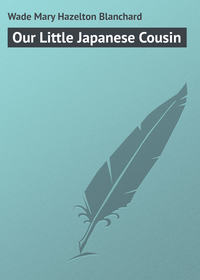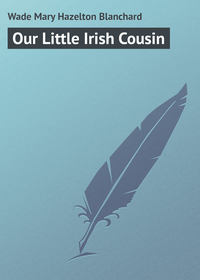 полная версия
полная версияOur Little Hawaiian Cousin
"We must hurry, Auwae. Hiko is going in half an hour, and he will not wait for us."
Auwae is instantly wide awake, and after a loving "Aloha!" to her mother, she hurries to the shore with Upa.
The old fisherman is already there in his long, clumsy-looking canoe. He hollowed it from the trunk of a tree, and there is just room enough inside for himself and the two children. At one side of the boat there is an outrigger to balance it, and make it quite safe.
Hiko has a queer-looking paddle in his hand, and another beside him. These paddles are like clumsy wooden spoons; it seems wonderful how fast they can make the boat travel over the water.
The children wade out from the shore to the deeper water where the boat is riding; then with a bound they spring into their places, Auwae to steer, and Upa to seize the other paddle.
On they go till they are directly over the coral reef. The sea is a beautiful green, and as clear as glass. Now they let the boat float along, and all eyes are bent down upon the groves of coral below the water. All at once Hiko rises suddenly to his feet, and springs upon the edge of the canoe; but first he seizes in one hand a small fish-net, and in the other a palm leaf.
Ah! down he dives, straight over the side of the boat! Down! down! Will he ever come back? Do not fear. This is mere sport for him, – surprising a shoal of fish at play among the coral spires. To the waiting children it seems as though he were gone a long time, but in reality it is no more than a minute.
As he appears again out of the water they shout in excitement, "What luck, Hiko? What luck?" But they do not need to ask, for they see that his net is half-full. He has actually brushed the fish into it with his palm leaf, as your mother brushes crumbs from the table into the tray.
How beautiful are these fish! They are of many colours: red, green, blue, and yellow. Among them is one of a delicate pink tint, shaped much like a trout. Still another is a queer-looking fish with a purple body, a blue spotted tail, and a dark head that shines brightly in the sunlight.
But the greatest treasure in the old man's collection is the sea-cock, or ki-hi ki-hi, as he calls it. Its back is covered with stripes of black and yellow; it is perfectly round in shape, while a long, transparent ribbon is fastened to its nose.
Hiko lifts the sea-cock from the net with great pride. To show the children how beautiful it is while floating in the water, he fastens a cord through the creature's head, and drops it below the surface. It looks now like a gorgeous butterfly as it trails after the boat.
But Hiko is not satisfied yet. He says he will dive once more, as he wishes to give Upa's mother a goodly mess of fish for her supper. At the next dive he is gone for a longer time than before. Auwae grows fearful just as his old face appears once more. He is puffing hard for breath, and his eyes are red and blood-shot. He has been even more successful this time, but is quite tired. He tells the children they can allow the boat to float for awhile. They may rest for a luncheon on some of the dainties he has just secured. Each may choose the fish liked best.
It seems queer to see the pleasure with which Auwae's pearly teeth meet in the tail of the sea-cock. But such is the habit of her people, and raw fish seems no stranger food to her than fresh-picked strawberries or pineapples.
The party now paddle their way homewards. But, listen! A sound of music comes from the direction of the shore. See! there are at least four canoes filled with people. They are coming out for a race, and, as they move along, are merrily singing in rhythm with the motion of their paddles.
As they come nearer, our little brown maiden sees her father and mother amongst the party. She stands up in the canoe, and shouts: "Oh, mamma! we have had such fun! Hiko says we may stay out and race with you, too."
And now Hiko turns the canoe in the direction all the others are going. The surf is running high; there is a good breeze blowing toward shore, so there will be fine sport. All who hold paddles work with a will, and the canoes are soon beyond the breakers; then they line up and watch for a big roller.
They have only a minute to wait; all eyes turn as Hiko shouts, "Hoi! hoi!" ("paddle with all your might").
The canoes rush onward with all the force the rowers can put into them; for the boats must be moving fast enough when the breaker reaches them to keep up with the onrushing water. Otherwise they will be overturned, and the people obliged to swim ashore; which would certainly not be pleasant.
Hurrah! The canoes are suddenly lifted up to a great height by the mighty power of the roller; then down they suddenly drop to level water again and speed onward to the shore. It is like a long, grand toboggan slide, only it is on water instead of snow or ice.
Auwae's boat reaches the beach first of all. There is a shout of laughter from the gay company who follow. It is because one of the canoes has been left far behind the others. Of course the best fun lies in winning this queer water race.
The sport continues for an hour or more, till it seems as though every one must be tired out. Then they draw the canoes up on the shore and lie about on the sand for story telling.
CHAPTER IX.
STORIES OF OLDEN TIME
Auwae's father repeats a legend handed down through generations of his family. "More than four hundred years ago," he says, "not far from this very spot, there lived a great chief. His home was not Hawaii, but he came from a distant land to fight and win honour under the king of this island. He became powerful, and was much loved by the people. His relatives followed, and settled here with him, and all went merry.
"The time for the monthly festival drew near; games, races, and trials of strength were planned to make a pleasant holiday for all. The chief himself was to take part. He and his dearest friend were both well trained in sliding down the steep hillsides on their polished sledges; so they agreed to vie with each other at the festival to see who could win.
"How seldom, friends, these sledges are used now! What a grand sport it was! I have a sledge at home used by my father, not more than six inches wide, and at least eight feet long. The runners are finely curved and polished. You must all have seen it.
"But to come back to my story. The chief knew well just how to throw himself upon the sledge; he knew the difficult art of keeping his sledge under him as he slid down the steep race track; he was able to guide his sledge with the greatest skill.
"But his friend was as skilful as himself, so the people expected a close contest. Many wagers of bunches of bananas and fat pigs were made.
"The time came, and the two men went up the hillside with their sledges under their arms. They laughed and chatted, and had just reached the top when a beautiful young woman suddenly appeared before them.
"She bowed before the chief, and said, 'Will you try the race with me instead of your friend?'
"'What!' he exclaimed, 'with a woman?'
"'What difference should that make, if she is greater and more skilful than you?' was her answer.
"The chief was angered, but he only replied, 'Then take my friend's sledge and make ready.'
"And so these two, the chief and the strange, beautiful woman, rushed down the hillside. For a single moment she lost her balance, and the chief reached the goal first.
"How the people cheered and shouted! But the woman silently pointed toward the top, as much as to say, 'Let us have one more trial.'
"Again the chief climbed the hillside, this time with the woman by his side. As they were about to start once more, the stranger exclaimed:
"'Your sledge is better than mine; if you wish to be just, you will exchange yours for mine.'
"'Why should I?' answered the chief. 'I do not know you. You are not a sister or wife of mine.' And he turned without further heed and flung himself down the steep descent, supposing the woman was also on the way.
"But not so! She stamped her foot upon the ground, and suddenly a stream of burning lava poured forth and rushed down the hillside. The chief reached the foot of the hill and turned to see the fiery torrent destroying everything in its way.
"Too late, he understood everything now. The strange woman was none other than the goddess Pele, who had taken this form to sport with men. He had angered her, and she was about to destroy him and all his people.
"And look! There rode the goddess, herself, on the crest of the foremost wave of lava. What should he do? He instantly turned aside and fled with his friend to a small hill from which he could see the awful death of his people.
"And now the valleys were filled with the burning torrent. Pele did not intend to let him escape. Nothing was left but the ocean. He reached it just as his brother drew near in his canoe. Together they fled to their old home across the waters, and never again dared to visit Hawaii, lest the dreadful goddess should come forth against him."
When the story is finished, tales are told of the old days of war and bloodshed; when the word of the chief was law to his people; when no life was safe from the power of the priests and chiefs. Then, indeed, were surely needed the cities of refuge still standing on this island.
"It is at least a hundred years ago," says old Hiko, "that my grandfather fled to the Pahonua, that strong old city whose walls have sheltered many an innocent man and helpless woman. He was accused of breaking the 'tabu' the chief of his village had laid upon a certain spring of water." (Of course, as you know, "tabu" means sacred, and so the water of that spring must not be used by any one except the chief himself.)
"My grandfather was then a young man, gay and happy. He would never have dared to break the tabu, but an enemy accused him of so doing, and the chief sent armed men to kill him. A good friend heard of it in time to warn him, and he fled over the mountains on his trusty horse.
"His pursuers were in full view when he reached the entrance to the city of refuge. Here they believed he was under the protection of the gods, so they turned back. Drawing a long breath of relief, he entered the city. He lived for some days in one of the houses built inside its massive walls. Then he came home again without fear, for he could never more be harmed for the deed of which he had been accused.
"In those times, my children," says the old man, "the thief, even the murderer, was pardoned, once he reached the city of refuge. And during wars it was the place to which women and children fled; there alone were they safe."
But the people are rested now, and do not care to think longer of the olden times. As the tide is far out, a dance upon the beach is proposed. Upa pounds his drum, and another of the party plays upon a bamboo flute. All the others move about on the coral sand in slow, graceful circles.
While they are enjoying themselves in this way, we can examine Upa's drum. He made it from the hollow trunk of a cocoa-palm. It is covered with shark's skin. Odd as it seems to us, it serves his purpose very well, and the boy keeps good time with the dancers. While he beats upon it he delights in watching Auwae move about on the sand. She is the very picture of grace and happiness.
CHAPTER X.
UP THE MOUNTAIN
The pleasant days pass by for Auwae and Upa, and the time comes for the great trip to Kilauea. You must understand that Kilauea is not the volcano itself, but the largest crater on the side of Mauna Loa. Many grown people as well as children picture a volcano as a great cone with only one deep pit, down into which they can look when they reach the summit.
This is not always so; for the fire raging in the heart of Mauna Loa has burst out in more than one place on its sides. Kilauea is the largest of these outlets, or craters. It is a hard journey to climb even so far as this. Very few people are daring enough to go still farther and journey to the summit of Mauna Loa.
Auwae's mother actually grows excited while she gets her little daughter ready for the trip. She does not care to go herself.
"It is too much work. I know I should get tired; but you can tell me all about it, my child, when you come back. Then I can see it through your eyes. And Upa's father will be kind, and will take good care of you. I shall not worry."
When the first light of the morning shines through the tree tops, three clumsy-looking horses stand in front of Auwae's door. Upa and his father use two of them; the third one is for our little brown maiden, who appears with a fresh garland of flowers upon her head and a smile on her red lips.
She springs upon the saddle without help, and sits astride of the horse just as Upa does. In fact, all Hawaiians ride in this way, and it is very wise. The women could not travel safely over the rough mountain passes if they rode like their white cousins.
"Aloha! Aloha! Aloha!" echoes through the grove, and the party is soon out of sight. They have more than thirty miles of climbing before them; the horses must walk nearly all the way, as it is a steady rise from the village to the edge of the great crater.
At first, the way is through a perfect forest of breadfruit, candlenut, and palm trees. Among them are ferns growing from twenty to thirty feet high! Their great stalks are covered with a silky, golden-brown fibre. Other ferns, more delicate, are wound around these and live upon their life.
It is cool in the shade of the trees; the way is narrow and the horses must go in single file to keep out of the thick underbrush. Presently the way grows lighter and the party come out of the forest and pass a large sugar plantation. Chinese labourers are cutting down the long canes and carrying them to the mill to be crushed. The white overseers are hurrying from one place to another, urging on the men and giving directions, while through it all Auwae can hear the rush and roar of a waterfall. She cannot see it, because the mill and boiler-house hide it from her sight.
The party move to one side to let a team of mules pass them on the narrow road. The mules are laden with kegs of sugar which must be carried to the coast and shipped to distant lands.
The children would like to stop awhile on the plantation, but Upa's father says they must not delay. It will be evening before they can reach the volcano-house.
As they climb higher and higher up the mountainside, the air grows cooler, yet the heat from the sun is so great they are still too warm for comfort. Suddenly a heavy shower takes them by surprise, and Auwae cries out in delight:
"Upa, isn't this fun? I'm going to open my mouth and let the raindrops fall right in. I'm so thirsty! Aren't you?"
The children lie back in their saddles and leave their trusty horses to follow their leader onward and ever upward. No one gives a thought to wet clothing, for will it not be dry again a few minutes after the rain stops falling?
See! the lava-beds stretch out before them. It is clear enough now that Hawaii, the island of flowers, was born of fire. All these miles of gray, shining substance once poured, a broad river of fire, from the crater above. Some of the lava looks like broad waves; again, it is in pools, or rivers, or coils, with great caves here and there. These caves are really bubbles which have suddenly burst as they cooled.
Auwae looks off to each side of the road, built with so much labour up the mountain; then she thinks of what her grandmother has told her of her own journey to Kilauea, years ago. At that time there was no road over the lava-beds, and her horse slipped many times as he stepped on places smooth as glass. And many times his hoofs were badly cut on sharp edges, and left bloody marks behind him.
The air is quite still. Not a sound can be heard. No birds nor insects make their homes on these lava stretches. Yet do not think for a moment that nothing grows here. The moist air and the rains have been great workers, and, in some strange way, delicate ferns, nasturtiums, guavas, and even trees, have taken root, so that the lava-beds are nearly covered.
Hour after hour passes by. Auwae gets so tired she nearly falls from her horse. The luncheon has been eaten long ago. There is no water to drink except what the showers have left in little hollows by the wayside. The children have stopped their chatter and lie with closed eyes on their horses' backs. The smell of sulphur grows strong, and Upa's father turns around to call out:
"Children, here we are at last! And there is my old friend Lono in the doorway to welcome us."
CHAPTER XI.
THE VOLCANO
Auwae suddenly forgets the long and tiresome ride, as she jumps from her horse's back in front of the hotel. This hotel is built on the edge of a crater! Think of the family who live here year after year! Night after night they look from the windows upon the raging fire below, yet are not afraid. Many a time the earth shakes beneath them, and the house rocks to and fro. The shelf of lava on which it stands may break at any moment, and the people within may suddenly be flung over the precipice. Yet they live on, and work and play as others do who have nothing to fear.
In many places around the house are cracks in the earth from which sulphur fumes are rising. As the children look out in front they see the crater itself, more than nine miles round, and nearly a quarter of a mile deep.
As they creep out and look over the edge, what is before them? The crater is filled with steam, while over in a distant corner of the pit they look for the first time upon the "house of everlasting fire," as the old legends call it, – the home of the goddess Pele.
The flames rise and fall, now high enough to light up the evening sky, now low as though dying out, and with it can be heard the breathing of this great furnace of nature. It sounds like the restless ocean many miles away.
Auwae and Upa hold each other's hands tightly and do not speak. Surely this is a wonderful sight. They will not forget it as long as they live.
They are so tired, however, that they are soon fast asleep in "white people's beds," as they call them. They do not awake till the sun has driven away the clouds which hang about the place in the early hours of morning. Upa's father has already eaten breakfast and attended to his business with the landlord.
He tells the children that horses are at the door to carry them down into the crater; for they have begged him to let them see everything possible.
What a ride this is down the rough, jagged side of the pit! The horses pick their way step by step over the sharp broken lava. But even here beautiful things are growing. There are delicate ferns, silvery grasses, pink, white, and brilliant blue berries. It seems as though Mother Nature wished to hide the frightful masses of black and gray lava.
Now the air gets very hot; steam and sulphur pour through great cracks in the floor of the crater; the lava itself will burn if Auwae dares to touch it with her fingers.
The floor of the crater, looking quite even from above, is broken up into hills and valleys, immense ridges and rivers of lava which have poured forth, one above the other, at different times.
After two hours of hard riding and walking, Auwae and Upa reach the lake of living fire and look down, down, into its depths. But they cannot see the bottom. Each throws in a garland of flowers as an offering to the goddess Pele. They know she does not exist, but it is an old, old custom of the people, and they have not quite grown out of the idea that it is safest to do so.
For, look at the flames leaping up at this very moment! "People may be mistaken," thinks Auwae, "and the goddess may get angry if we are not polite, and suddenly drown us in fire!"
It is dinner-time before the party get back to the hotel. They are willing to rest all the afternoon under the tree-ferns near the house. They lazily pick the ohele berries growing about them, as they tell the village news to the landlord's family.
On the evening of the third day our little brown maiden finds herself safe at home once more. She is very well, but quite lame and sore from her long ride. Her mother says she shall have a lomi-lomi, and she will feel all right again.
Auwae stretches herself out on a mat while an old woman of the village pinches and pounds and kneads every part of her dear little body. Do you suppose it hurts? Just try it yourself the first time you have a chance, and when it is over see if you do not feel as limber and care-free as Auwae does.
She dances about under the trees, and exclaims: "Oh, how nice it is to be alive! What a lovely home I have! But I'm glad I've been to Kilauea, though I would not like to live there."
At this moment she sees her father coming down the path to the house. He was away when she got home, and she runs to welcome him.
"But, dear papa, what are you hiding behind you?" she cries.
"I have a present for my little daughter," he answers. "It has cost a large sum, but my only child deserves it, I well know. It is something for you to treasure all your life."
He hands her a bamboo cylinder, telling her to see what is inside. The excited girl opens one end, and out falls a band of tiny yellow feathers to be worn as a wreath. It is more precious to this Hawaiian child than a diamond ring or gold necklace could possibly be.
Why, do you ask? Because of the time and labour in getting the feathers, which are found on only one kind of bird in the islands, or any other place, for that matter. This little creature is called the oo. It lives among the mountains. Under each of its wings are a few bright yellow feathers no more than an inch long. Hunters spend their lives in snaring this bird. They place long sticks smeared with a sticky substance where the oo is apt to alight. After it is caught, the precious feathers are plucked and the bird set free.
While Auwae crowns herself with her new wreath, her father tells her that next month she shall go away with him on a steamboat. She shall visit Honolulu, the capital of the islands. There she shall see the wonderful war-cloak of Kamehameha the Great. It is made entirely of oo feathers. Nine kings lived and died, one after the other, before this priceless cloak was finished. And now it is guarded as one of the greatest treasures of the country.
Yes, Auwae shall see, not only this, but many wonders beside. She shall ride through the streets with neither man nor animal to carry her. She shall talk with people miles away by placing her mouth to a tube. She shall see how her white cousins live and dress.
But her father does not doubt that she will be glad to come home again to this little grass house with the quiet and the peace of the village life.
1
This volcano is not constantly, but intermittently, in eruption.









